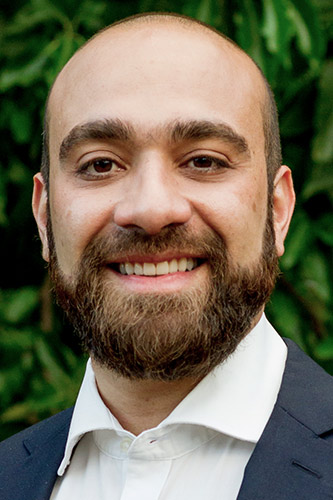
 The musings of one volunteer summarize the problem: "As a newcomer to ICANN, I was always frustrated by the fact that I could never get a straight answer to the question 'How much time does it take?' There was always an awkward silence, a vaguely worded response. Now, years later, I know that no one in their right mind would sign up knowingly for the long hours and late shifts required to be a full participant in this game. It is a groundbreaking project that really matters. But you will get a lot more recognition and immediate satisfaction for volunteering far fewer hours at your local food bank." more
The musings of one volunteer summarize the problem: "As a newcomer to ICANN, I was always frustrated by the fact that I could never get a straight answer to the question 'How much time does it take?' There was always an awkward silence, a vaguely worded response. Now, years later, I know that no one in their right mind would sign up knowingly for the long hours and late shifts required to be a full participant in this game. It is a groundbreaking project that really matters. But you will get a lot more recognition and immediate satisfaction for volunteering far fewer hours at your local food bank." more
 As we watch the Ukraine and Russia conflict over boundaries and territories, I chanced upon a YouTube video showing the region of Europe and how, for the last 1000 years, national boundaries and names of nations have changed where in 1142, you had nations like Muslim Spain, Kievan Rus. In 1143 the Kievan Rus included modern-day Ukraine and Crimea, and in 1163 bulk of Central and Southern Europe was the Holy Roman Empire... more
As we watch the Ukraine and Russia conflict over boundaries and territories, I chanced upon a YouTube video showing the region of Europe and how, for the last 1000 years, national boundaries and names of nations have changed where in 1142, you had nations like Muslim Spain, Kievan Rus. In 1143 the Kievan Rus included modern-day Ukraine and Crimea, and in 1163 bulk of Central and Southern Europe was the Holy Roman Empire... more
 The Internet Corporation for Assigned Names and Numbers (ICANN) is a not-for-profit corporation, which essentially functions as a governing body for the Internet and brings together representatives from government, civil society, academia, the private sector, and the technical community. Despite its importance in crafting policies related to world wide web development, a significant portion of digital rights lawyers underestimates ICANN’s regulatory role in contrast to one of the national governments. more
The Internet Corporation for Assigned Names and Numbers (ICANN) is a not-for-profit corporation, which essentially functions as a governing body for the Internet and brings together representatives from government, civil society, academia, the private sector, and the technical community. Despite its importance in crafting policies related to world wide web development, a significant portion of digital rights lawyers underestimates ICANN’s regulatory role in contrast to one of the national governments. more
 Imagine that you run an organization out of a building. Imagine that the landlord comes one day and says, "Oh I didn't know you are a resident of country X or dealing with anybody from country X. I have to close this place down right now." And then you are done. You don't have an organization anymore. This very scenario happens on the Internet. more
Imagine that you run an organization out of a building. Imagine that the landlord comes one day and says, "Oh I didn't know you are a resident of country X or dealing with anybody from country X. I have to close this place down right now." And then you are done. You don't have an organization anymore. This very scenario happens on the Internet. more
 Time has come again, another year of general elections in Brazil. Some 30,000 candidates are running for Executive and Legislative seats: 1 President, 27 State Governors, 27 Federal Senators, 513 Federal Deputies, 1059 State Deputies, 24 District Deputies to govern 212+ million people and one of the largest economies in the world. For a few lucky industries, success and failure do not correlate with who is in power; for others, policy and regulation are everyday business. more
Time has come again, another year of general elections in Brazil. Some 30,000 candidates are running for Executive and Legislative seats: 1 President, 27 State Governors, 27 Federal Senators, 513 Federal Deputies, 1059 State Deputies, 24 District Deputies to govern 212+ million people and one of the largest economies in the world. For a few lucky industries, success and failure do not correlate with who is in power; for others, policy and regulation are everyday business. more
 A few weeks ago, a new vacancy was added to the UN Webpage for Senior Leadership Positions, inviting applications to become the new Tech Envoy. This position has a long and unfortunate backstory. It was created in 2019 as a new role, as an outgrowth of the UN's High-Level Panel on Digital Cooperation and the UN Secretary General's Roadmap for Digital Cooperation -- with a vague remit to "advise senior leadership of the United Nations on key trends in technology and... more
A few weeks ago, a new vacancy was added to the UN Webpage for Senior Leadership Positions, inviting applications to become the new Tech Envoy. This position has a long and unfortunate backstory. It was created in 2019 as a new role, as an outgrowth of the UN's High-Level Panel on Digital Cooperation and the UN Secretary General's Roadmap for Digital Cooperation -- with a vague remit to "advise senior leadership of the United Nations on key trends in technology and... more
 The UK government is proposing new regulations to strengthen cyber resilience in the private sector. Their intention is to expand cybersecurity rules for critical infrastructure (CI) operators to include managed service providers (MSPs), more stringent breach notification requirements, and legislation to establish the UK Cyber Security Council as the standards development organization for the cybersecurity profession. This is a welcomed development, but more details about implementation and enforcement are needed. more
The UK government is proposing new regulations to strengthen cyber resilience in the private sector. Their intention is to expand cybersecurity rules for critical infrastructure (CI) operators to include managed service providers (MSPs), more stringent breach notification requirements, and legislation to establish the UK Cyber Security Council as the standards development organization for the cybersecurity profession. This is a welcomed development, but more details about implementation and enforcement are needed. more
 The UK government launched its 2022 Cyber Security Strategy on 15 December 2021, outlining its ambitious plans to improve the resilience of UK institutions and businesses while protecting the country's interests in cyberspace. The strategy signals a more involved approach by the government, which previously relied heavily on the private sector for leadership. The government's stated commitment to a 'whole of society' approach sounds really good on paper, but what exactly does it really mean? more
The UK government launched its 2022 Cyber Security Strategy on 15 December 2021, outlining its ambitious plans to improve the resilience of UK institutions and businesses while protecting the country's interests in cyberspace. The strategy signals a more involved approach by the government, which previously relied heavily on the private sector for leadership. The government's stated commitment to a 'whole of society' approach sounds really good on paper, but what exactly does it really mean? more
 Recently, there has been an interesting development in the liability of Internet intermediaries in Germany, and I will comment here in this text. The "Act on Copyright Liability Online Content Sharing Service Providers" began to apply on August 1, 2021 in the country. This act is a German attempt to deal with the controversy generated by the approval in 2019 of the new European directive on copyright, specifically with article 17. more
Recently, there has been an interesting development in the liability of Internet intermediaries in Germany, and I will comment here in this text. The "Act on Copyright Liability Online Content Sharing Service Providers" began to apply on August 1, 2021 in the country. This act is a German attempt to deal with the controversy generated by the approval in 2019 of the new European directive on copyright, specifically with article 17. more
 In late 2021, the term Web3 began to increasingly appear in mainstream media outlets. This does not refer, however, to a sudden increase in interest in the Semantic Web as defined by Tim Berners-Lee, but rather to something entirely different. Enthusiasts of cryptocurrencies and nonfungible tokens (NFTs) seized this term and changed its meaning to reflect a supposed new stage of the Web, running on top of blockchains and having decentralization as its core value. To summarize the narrative being spun, the first generation of the Web afforded independence to the owners of websites, but this did not extend to the average user... more
In late 2021, the term Web3 began to increasingly appear in mainstream media outlets. This does not refer, however, to a sudden increase in interest in the Semantic Web as defined by Tim Berners-Lee, but rather to something entirely different. Enthusiasts of cryptocurrencies and nonfungible tokens (NFTs) seized this term and changed its meaning to reflect a supposed new stage of the Web, running on top of blockchains and having decentralization as its core value. To summarize the narrative being spun, the first generation of the Web afforded independence to the owners of websites, but this did not extend to the average user... more
 As a designated committee of experts prepares to draft a new treaty to combat the use of information and communications technologies in cybercrime at the UN in January 2022, it is paramount that other stakeholders oversee these discussions to avoid violating human rights on the Internet. This initiative was kickstarted by a 2019 resolution led by Russia and endorsed by other countries considered by many to behavior controversially on cybersecurity matters, such as China, Venezuela, Cambodia, North Korea, and others. more
As a designated committee of experts prepares to draft a new treaty to combat the use of information and communications technologies in cybercrime at the UN in January 2022, it is paramount that other stakeholders oversee these discussions to avoid violating human rights on the Internet. This initiative was kickstarted by a 2019 resolution led by Russia and endorsed by other countries considered by many to behavior controversially on cybersecurity matters, such as China, Venezuela, Cambodia, North Korea, and others. more
 Earlier this year, The Alliance for Safe Online Pharmacies (ASOP) released findings from their 2021 survey on American Perceptions and Use of Online Pharmacies. According to ASOP's data, U.S. residents' use of online pharmacies to purchase prescription medications continues to increase yearly. In 2021, 42% of Americans purchased medications from online pharmacies, either for themselves or family members under their care. This is a significant increase of 7% since just last year. more
Earlier this year, The Alliance for Safe Online Pharmacies (ASOP) released findings from their 2021 survey on American Perceptions and Use of Online Pharmacies. According to ASOP's data, U.S. residents' use of online pharmacies to purchase prescription medications continues to increase yearly. In 2021, 42% of Americans purchased medications from online pharmacies, either for themselves or family members under their care. This is a significant increase of 7% since just last year. more
Join the upcoming discussion today on the past, present and future of the Internet in Afghanistan in the context of the Middle East. Panelists will address the national and international challenges and opportunities Afghans face in the changing environment of global Internet governance and sanctions laws. more
 Another challenging year due to the Corona pandemic is coming to a close, and ICANN has held another virtual annual general meeting (AGM) -- the 6th in a row. Unlike last year, today, we can hope for a better next year. In many regions of the world, the figures look better, and the opening is progressing. That at least gives us hope that ICANN will hold face-to-face meetings again next year -- at least they are planning it so. That should also make it easier for the new Nominating Committee (NomCom). more
Another challenging year due to the Corona pandemic is coming to a close, and ICANN has held another virtual annual general meeting (AGM) -- the 6th in a row. Unlike last year, today, we can hope for a better next year. In many regions of the world, the figures look better, and the opening is progressing. That at least gives us hope that ICANN will hold face-to-face meetings again next year -- at least they are planning it so. That should also make it easier for the new Nominating Committee (NomCom). more
 In April, I published an article, The Multistakeholder Moment of Truth: Will Stakeholders Hold ICANN Accountable?, alerting stakeholders that ICANN is violating its legal agreements with the U.S. Government -- namely the InterNIC licensing agreement and merged Memorandum of Understanding. At that time, I warned that it is essential for stakeholders not to remain silent in the face of this transgression, "hoping that such behavior left unchecked will end of its own accord." more
In April, I published an article, The Multistakeholder Moment of Truth: Will Stakeholders Hold ICANN Accountable?, alerting stakeholders that ICANN is violating its legal agreements with the U.S. Government -- namely the InterNIC licensing agreement and merged Memorandum of Understanding. At that time, I warned that it is essential for stakeholders not to remain silent in the face of this transgression, "hoping that such behavior left unchecked will end of its own accord." more